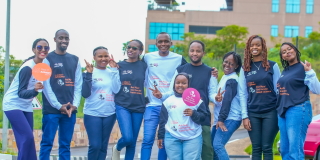
January 2021 to December 2025
Embracing intersectionality for inclusion.
Our vision: Sexual and reproductive health and rights for all
Everybody, including those who are most marginalised, should be able to realise their sexual and reproductive health and rights (SRHR). SRHR are human rights, that allow people to make informed decisions about relationships, their bodies, family planning, sexuality, and wellbeing.
It also means having access to a full range of sexual and reproductive health services, including antenatal and maternal care, prevention detection and treatment of STIs, including HIV, choice of safe and effective contraceptive methods, prevention and management of sexual and gender-based violence, and a positive and comprehensive sexual education.
What is intersectionality?
Intersectionality refers to the idea that different aspects of a person's identity, such as ethnicity, gender, sexual orientation and class, intersect and overlap to create unique experiences of discrimination and privilege. Intersectionality makes us conscious of power and privilege - who has it and who does not and serves as a starting point for truly inclusive equity and justice work.
The Make Way project
Our five-year programme (2021-2025) aims to break down barriers to SRHR by promoting a new way of looking at, and organising, SRHR issues, through an intersectional lens. This means making overlapping vulnerabilities visible to understand their effects on people’s access to health services. Using insights and sound data, Make Way develops innovative tools and builds the capacities of other civil society organisations to advocate for policy and societal changes.
The issue
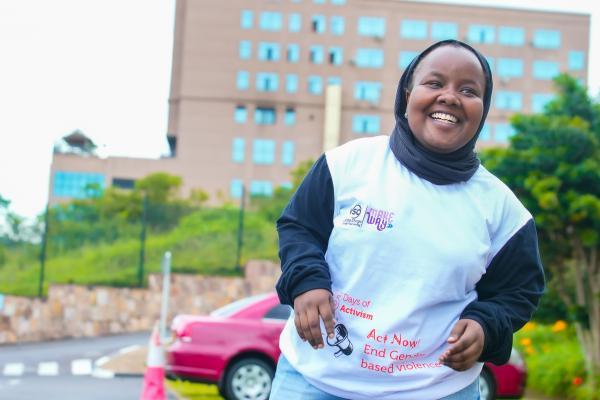
Many people cannot realise the full range of their SRHR, particularly, those with multiple, intersectional vulnerabilities. For example, youth (especially girls) living in poverty who have a disability face more barriers to accessing the services they need and want.
For youth to realise their sexual health rights, systematic change is needed. Negative societal views and (gender) norms cause stigma, discrimination, and exclusion. Sexual education is often not comprehensive and inclusive or even non-existent. Sexual and reproductive health (SRH) services are often not accessible or of low quality.
This is due to a chronically underfunded and understaffed health systems as well as persistent siloes in health system funding. Moreover, youth are not involved in decision-making that affects their lives, and their rights and needs are not reflected in SRH policies and health systems. Civil society organisations working on SRHR have limited (financial) support, and the SRHR agenda lacks intersectional awareness.
For everyone to realise their SRHR fully, change is needed at various levels:
- Marginalised youth need to speak out collectively in defence of their SRHR and hold duty-bearers to account;
- Duty-bearers at (sub)national, regional and global levels need to formulate and implement strategies, policies and plans with an intersectional lens that lead to quality SRHR services, available, accessible and acceptable for all;
- Society at large needs to respect the SRHR of all, including marginalised youth and leave no one behind.
How Make Way is breaking down barriers to reproductive health
Make Way promotes innovative practices in intersectional SRHR advocacy. We have developed new types of tools to analyse the complexity of SRHR inequities and identify solutions to the interrelated barriers that marginalised youth face.
The project has trained and mentored a wide range of organisations and their youth representatives - from community to global level - to take up intersectional SRHR advocacy and push for the change they want to see in their communities and amongst local, national, regional, and global decision-makers.
It is also our objective to widen the civic space for marginalised youth to stand up for their SRHR. Increasingly, under mentorship and guidance, our youth are able to lobby and advocate for their own rights.
I was born with HIV. Due to poor medical treatment, in 2009 I contracted meningitis, which left me blind and with impaired hearing in my right ear. That is why I am now campaigning with my new organisation Positive Movement for an inclusive society for young people with HIV or a disability – or both, like me."
- Youth activist from Zambia
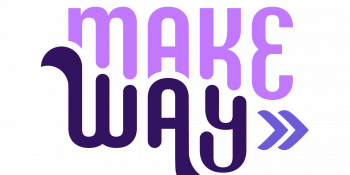
Make Way Toolkit
Try the Make Way Toolkit and apply the principles underlying intersectionality to your approach.
The Make Way toolkit
The Make Way SRHR toolkit is a comprehensive package of materials that sets out to increase and improve the capacity, skills and knowledge of civil society groups and organisations, that will enable them to undertake game changing intersectional SRHR lobby and advocacy.
This toolkit consists of a wide range of tools – each with a different purpose – for the steps that make up an advocacy cycle.
Some tools build an understanding of the concept of intersectionality or help clarify values. Other tools are about applying the principles that underlie intersectionality to policy analysis, communication and community engagement.
Where Make Way takes place
Ethiopia
In Ethiopia, the weak infrastructure, limited distribution systems, and poor service quality have hindered universal access to healthcare services (Woldemichael, et.al). The country has limited resources. It is also a society with oppressive social norms, as well as misconceptions about different minoritised groups. All this means that if any SRH services are available, it is extremely difficult for women, people with disabilities, and female sex workers to get access to them.
The overall focus of Make Way Ethiopia is to improve the country’s policy environment for effective implementation of SRH services for minoritised young people. By building the capacities of collaborating partners, the programme aims to facilitate the advocacy done to make SRH services better. And to make these services available for sex workers, people with disabilities, and out-of-school youth, as well as for young, internally displaced people.
Kenya
Kenya has a young and rapidly growing population of 47.6 million people. According to the 2019 population census, 75% of the population are under the age of 35 and 59% under the age of 25. But these young people are not all the same.
The programme aims to achieve its objective of enhancing access to SRHR for youth facing discrimination through innovative lobby and advocacy by youth civil society organisations and their allies. To reach the ambitious yet essential goal, it will work on the critical issues identified by strengthening youth leadership. Of the 11 collaborating partners, four are youth-led and youth are the leading voice in ensuring that young people who face discrimination, can exercise their right to SRHR.
The project does this by utilising a community of civil society organisations (CSOs) who actively work on intersectional lobby and advocacy at all levels, to ensure intersectionality is embedded at all levels of SRHR practice and policy.
Rwanda
Rwanda has recorded remarkable gains in the promotion of sexual and reproductive health (SRH) over the last few years, but access to a full service package for all categories of the population is still a long way off. The 2019-2021 Demographic Health Survey reveals that teenage pregnancies have been rising in recent years – mostly in rural areas.
The issues minoritised youth face in exercising their sexual and reproductive health and rights (SRHR) are generally stigma, discrimination and exclusion, fed by negative perceptions and societal norms. Youth with disabilities, for example, are seen as asexual.
Prevention of teenage pregnancies is a focus area. Pregnancy undermines a girl’s ability to exercise her rights to education, health and autonomy. The Make Way programme in Rwanda focuses on creating safe spaces for vulnerable youth, such as those with disabilities, teenage mothers, young people in isolated areas, sex workers and people living with HIV.
Make Way Rwanda has developed an innovative model for safe spaces: ‘Urubohokero’ – ‘judgement-free space’ in the Kinyarwanda language. Older girls are now giving sex education to young girls, especially about ways to prevent pregnancy and access SRH services and information. Youth panels play a big role in managing and shaping the safe spaces as the link between the coordination group, partners and young people.
Uganda
While Uganda has made some significant progress in the area of Sexual and Reproductive Health and Rights (SRHR), the country still experiences some challenges around access to SRHR.
Factors like education, wealth, location, and region in the country play a significant role in determining access to health. The 2016 Uganda Demographic Health Survey report highlighted that women in rural areas, women with no education, and women with low income are less likely to seek critical health care than their urban-dwelling, educated, and wealthier counterparts.
Make Way seeks to promote the adoption of an intersectional feminist approach to SRHR that enables people who are historically marginalized, like women, girls, LGBTQI+ people, youth, people from low-income communities and people living with disabilities, to have their needs accounted for in planning, budgeting and service delivery processes. The Make Way programme seeks to do this by building marginalised communities' lobbying and advocacy capacity and ensuring they have representatives in decision-making processes.
The project also strengthens the capacity of Civil Society Organizations to advocate and lobby for the change they want to see in their communities and amongst local, national, regional, and global decision-makers, while demanding that duty bearers implement policies and plans with an intersectional lens. The Make Way youth panel engages youth to ensure intersectional practices are part of Uganda’s present and future.
Zambia
Zambia is experiencing a sharp demographic shift and is one of the world’s youngest countries by median age. Its urban population is growing rapidly, at 2.9% per year, and will likely double every 25 years. As Zambia’s young people enter reproductive age, this increasing population will put even more pressure on the demand for jobs, healthcare and other social services.1 Adolescents and young people aged 10–24 comprise about a third of the Zambian population. This group faces several challenges in accessing sexual and reproductive health (SRH) services, with adolescent girls and young women disproportionately affected by poor SRH outcomes.2
The Make Way programme in Zambia focuses on improving SRH outcomes for the most minoritised young people and for those who face multiple vulnerabilities. Programme objectives are aligned to existing reproductive health policies and programmes in Zambia, aiming to reduce the barriers to sexual and reproductive health rights SRHR information and services.
Our partners
Make Way is a consortium programme, consisting of Akina Mama wa Afrika, The Circle of Concerned African Women Theologians, Kenya, Forum for African Women Educationalists, Liliane Foundation, VSO Netherlands, and Wemos (as lead). We work in partnership with the Dutch Ministry of Foreign Affairs.
Ethiopia: Ethiopian Women with Disabilities National Association (EWDNA), Ethiopian Youth Federation, Nikat Charitable Association, Redeem The Generation, Timret Lehiwot Ethiopia, Young Men’s Christian Association (YMCA), Organization for Development of Women and Children in Ethiopia (ODwACE).
Kenya: Akina Mama wa Afrika, FAWE - Kenya Chapter, The Circle of Concerned African Women Theologians, Cheshire Disability Services Kenya.
Rwanda: The National Union of Disabilities’ Organisations of Rwanda (NUDOR) leads the Make Way Country Coordination Group on behalf of Liliane Fonds. Make Way Rwanda has nine collaborating partners: Health Development Initiative (HDI), Empower Rwanda (ER), National Paralympic Committee (NPC), Rwanda National Union of the Deaf (RNUD), Impanuro Girls Initiative (IGI), Save Generations Organization (SGO), Learn Work and Develop (LWD), Hope Iwacu Initiative (HII) and AESD.
Uganda: Akina Mama wa Afrika.
Zambia: Forum for African Women Educationalists (FAWE).
Regional and global partners: Wemos, Share-Net Netherlands, GFF Hub, CHOICE for Youth & Sexuality, African Population and Health Research Centre (APHRC), Eastern Africa National Networks of AIDS and Health Service Organisations (EANNASO),SRHR Africa Trust (SAT).
Find out more
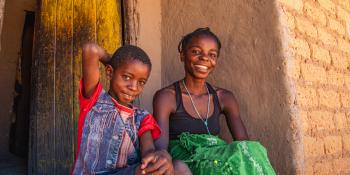
News from Make Way
The latest news from the Make Way project.

Make Way Toolkit
Try the Make Way Toolkit and apply the principles underlying intersectionality to your approach.
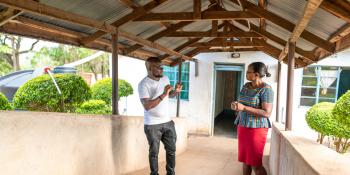
Make Way FAQs
The answers to all your frequently asked questions about the Make Way project.
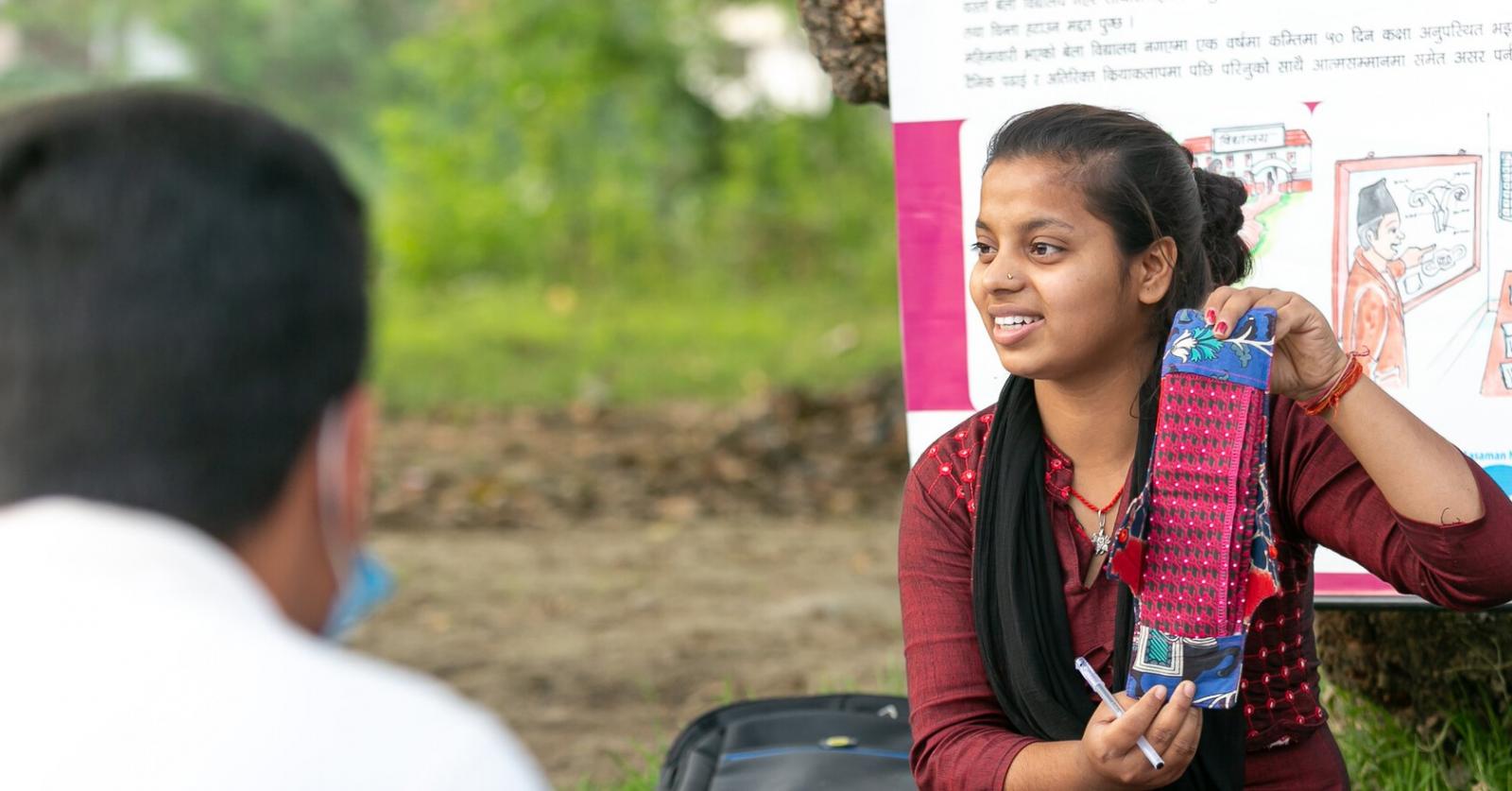
Support us with a donation
